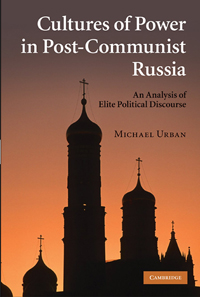Campus News
Professor’s new book explores the political discourse of Russia’s elite
In a new book, UC Santa Cruz politics professor and post-Soviet-era expert Michael Urban interviewed 34 prominent members of the administrations of Mikhail Gorbachev, Boris Yeltsin, and Vladimir Putin.


In the course of researching his latest book on post-communist Russia, UC Santa Cruz politics professor Michael Urban interviewed 34 prominent members of Russia’s political class.
Some are still involved in the political system, most are not. Specifically, Urban was interested in the conversations that go on among members of Russia’s elites. His new book, Cultures of Power in Post-Communist Russia: An Analysis of Elite Political Discourse (Cambridge University Press) builds on his earlier work on politics in Russia after the Soviet era.
Between May 2005 and June 2006, Urban talked with members of the administrations of Mikhail Gorbachev, Boris Yeltsin, and Vladimir Putin. He interviewed government ministers, including prime ministers, deputy prime ministers, and political party leaders.
“I let people talk,” Urban said. And talk they did, although some members of the Putin regime were initially reticent. The political actors talked about their thoughts and impressions of fundamental issues of political life, society, community, the state, law, morality, and political competence.
Analyzing narratives from the interviews, Urban shows that Russian political discourse lacks concepts for both law and a public. “Political communication occurs through personalistic categories,” Urban says. “This seems consistent with Russia’s history of authoritarianism, revolution and violence.”
Urban, who joined UC Santa Cruz in 1991, said he found some surprises in the more than 50 hours of conversations. For instance, in discussions of morality, he discovered that Russian political elites were primarily concerned with not letting their friends down.
That sense of morality might lead logically to what Americans could consider cronyism, and Urban found it to be a constant in Russian political discourse.
Urban’s topic for his book was a bit serendipitous, he said. He traveled to Russia in 2005 with another idea in mind but circumstances changed. He had the good fortune of an old friend in Moscow from previous work who was able to start making connections that led to the interviews.
Urban’s project was supported by grants from the UC Santa Cruz Academic Senate and National Council for Eurasian and East European Research.